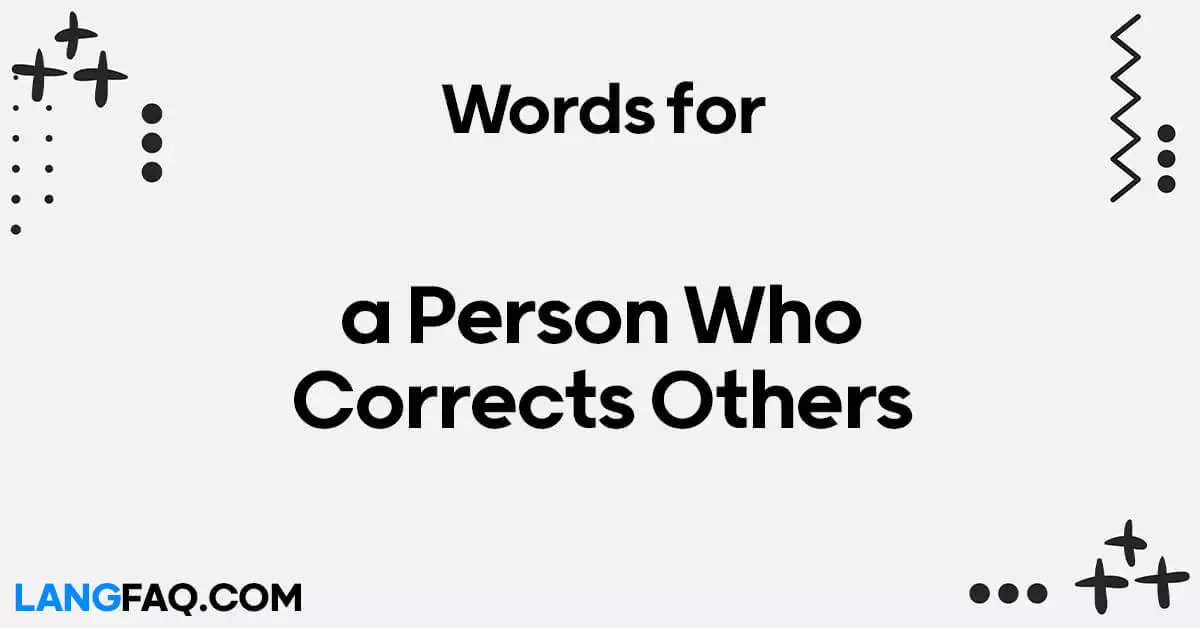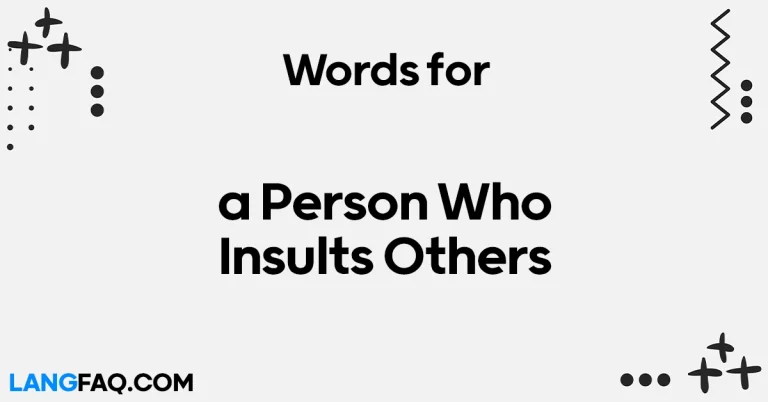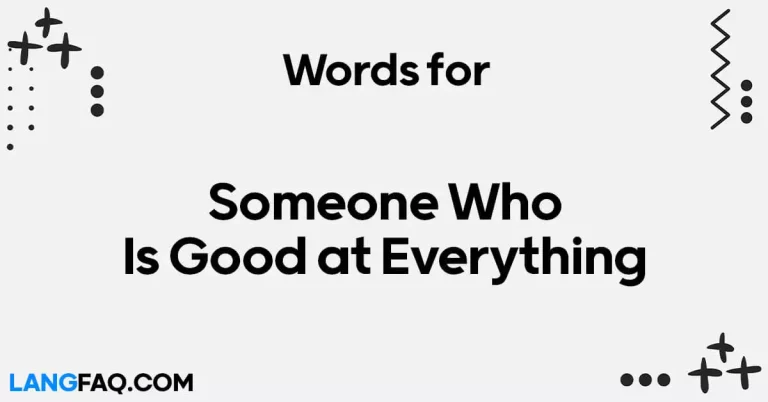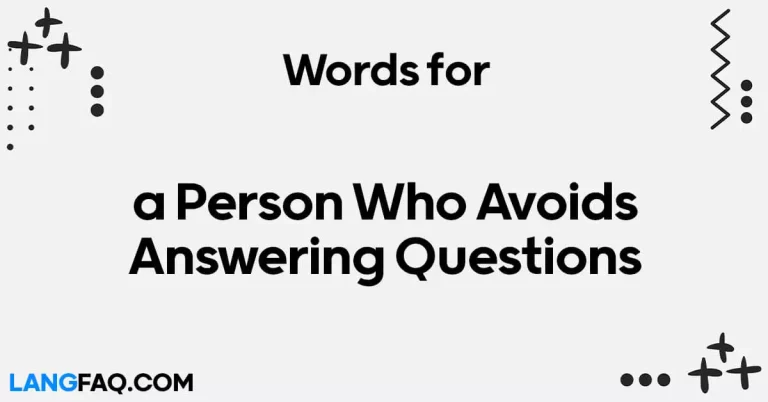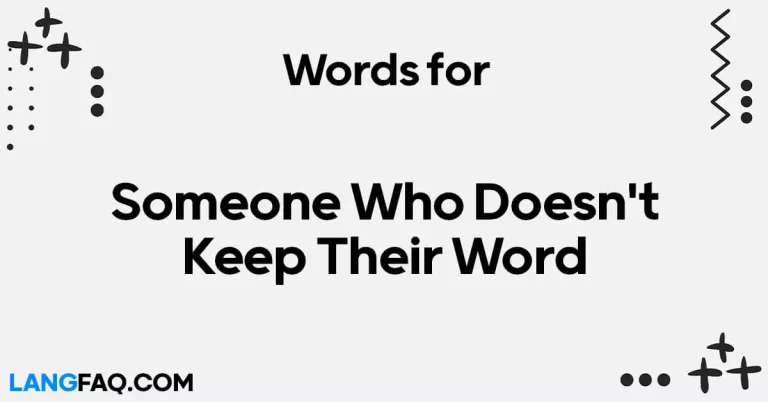In a world where knowledge and communication are valued, there is often a need for individuals who can provide corrections and insights.
But what do you call a person who corrects others? In this comprehensive article, we will delve into the various terms used to describe individuals who take on this important role.
From grammar enthusiasts to fact-checkers, we’ll explore the different names and roles they play in our lives. So, if you’ve ever wondered about the right term to use, keep reading!
Words for a Person Who Corrects Others
Here are some words and phrases you can use to describe a person who corrects others:
- Corrector
- Language enthusiast
- Grammar aficionado
- Perfectionist
- Precision advocate
- Pedant
- Language purist
- Grammar stickler
- Word nerd
- Lexicon watchdog
- Language expert
- Proofreader
- Linguistic critic
- Syntax supervisor
- Diction consultant
- Grammar expert
- Etymology enthusiast
- Vocabulary vet
- Punctuation perfectionist
- Language connoisseur
- Syntax sage
- Spelling specialist
- Linguistic arbiter
- Error detector
- Language mentor
These terms can be used depending on the context and the tone you want to convey when describing someone who corrects others.
1. Corrector: The Precision Advocate
Definition: A corrector is someone who pays meticulous attention to details, striving to ensure accuracy in language usage.
Usage: The term “corrector” is a straightforward and neutral way to describe someone who corrects others. It highlights their commitment to precision.
Example: John, a dedicated corrector, always points out grammatical errors in our reports, making our writing more precise.
Dictionary Insight: The dictionary defines a corrector as “someone who rectifies or adjusts errors.”
When to Use: “Corrector” is a versatile term that can be used in both formal and informal contexts to describe individuals who emphasize accuracy in language.
Grammar Tip: Correctors often focus on grammar rules, spelling, and punctuation.
Exception: Using “corrector” in a negative tone may imply nitpicking, so be mindful of the context.
2. Language Enthusiast: The Linguistic Explorer
Definition: A language enthusiast is someone who has a deep passion for the intricacies of language.
Usage: This term emphasizes the love and enthusiasm a person has for language. It’s a positive and inclusive way to describe those who correct others.
Example: Sarah, a true language enthusiast, can spend hours discussing the origins of words and their usage.
Dictionary Insight: While dictionaries may not have a specific definition for “language enthusiast,” it’s a widely understood term.
When to Use: “Language enthusiast” is a warm and welcoming phrase suitable for all situations. It celebrates a person’s love for language.
Grammar Tip: Language enthusiasts often delve into etymology, word origins, and linguistic history.
3. Grammar Aficionado: The Syntax Sage
Definition: A grammar aficionado is someone with an exceptional understanding of grammar rules and usage.
Usage: This term highlights a person’s expertise in grammar and their dedication to maintaining correctness.
Example: Emily, a grammar aficionado, always helps us improve our writing by explaining complex grammatical rules.
Dictionary Insight: “Aficionado” means a person who is enthusiastic and knowledgeable about a particular subject.
When to Use: “Grammar aficionado” is ideal when discussing someone’s in-depth knowledge of grammar and their role as a guide in language matters.
Grammar Tip: Grammar aficionados excel in explaining the intricacies of sentence structure and language mechanics.
Exception: Use this term with care, as it implies a high level of expertise in grammar.
4. Perfectionist: The Lexicon Watchdog
Definition: A perfectionist is someone who consistently seeks perfection in language usage.
Usage: While “perfectionist” is a broader term, it can be used to describe individuals who correct others out of a desire for linguistic perfection.
Example: Mark’s reputation as a perfectionist in language matters is well-deserved; he never lets an error go unnoticed.
Dictionary Insight: A perfectionist is defined as “a person who refuses to accept any standard short of perfection.”
When to Use: “Perfectionist” can be used when discussing individuals who strive for error-free communication, not just in language.
Grammar Tip: Perfectionists may focus on various aspects of language, including vocabulary, pronunciation, and syntax.
Exception: While perfectionism can be a positive trait, it may also lead to overly critical behavior.
5. Precision Advocate: The Diction Consultant
Definition: A precision advocate is someone who champions the importance of precision in language.
Usage: This term emphasizes a person’s role in promoting accuracy and clarity in communication.
Example: Tina, our precision advocate, believes that using the right words can make a significant difference in our presentations.
Dictionary Insight: The dictionary defines “advocate” as “a person who publicly supports or recommends a particular cause or policy.”
When to Use: “Precision advocate” is suitable when discussing someone who encourages others to be precise in their language.
Grammar Tip: Precision advocates often focus on word choice and diction.
Exception: This term is generally positive but may sound formal in casual conversations.
6. Pedant: The Language Purist
Definition: A pedant is someone who is overly concerned with minor details and correctness in language.
Usage: “Pedant” is a more critical term, often used to describe someone who corrects others excessively or in a pedantic manner.
Example: Jane can be a bit of a pedant when it comes to pronunciation; she insists on absolute correctness.
Dictionary Insight: A pedant is defined as “a person who is excessively concerned with minor details or rules.”
When to Use: Use “pedant” when the correction is excessive or overly nitpicky.
Grammar Tip: Pedants may focus on minor grammatical details that others might overlook.
Exception: Be cautious when using “pedant,” as it carries a negative connotation.
7. Lexicon Watchdog: The Vocabulary Vet
Definition: A lexicon watchdog is someone who meticulously monitors and corrects vocabulary usage.
Usage: This term highlights a person’s vigilance in ensuring that the right words are used.
Example: Alex, our resident lexicon watchdog, always enriches our conversations with his extensive vocabulary.
Dictionary Insight: A “lexicon” refers to the vocabulary of a language.
When to Use: “Lexicon watchdog” is apt when discussing someone who excels in vocabulary-related corrections.
Grammar Tip: Lexicon watchdogs pay attention to word choice and vocabulary enrichment.
8. Language Expert: The Syntax Sage
Definition: A language expert is someone who possesses an extensive knowledge of language, including its grammar, vocabulary, and usage.
Usage: The term “language expert” is a prestigious title that signifies a high level of expertise in all aspects of language.
Example: Dr. Smith, a renowned language expert, has published numerous books on the intricacies of language and communication.
Dictionary Insight: A language expert is characterized by their profound understanding of language and its nuances.
When to Use: “Language expert” is ideal when referring to individuals who have not only a deep knowledge of language but also significant contributions to the field.
Grammar Tip: Language experts are often consulted for their expertise in various language-related matters.
Exception: This term is a recognition of someone’s comprehensive knowledge and is typically used in a positive and respectful manner.
9. Proofreader: The Linguistic Arbiter
Definition: A proofreader is someone who examines written materials for errors in grammar, punctuation, spelling, and formatting.
Usage: Proofreaders play a crucial role in ensuring the accuracy and correctness of written documents.
Example: Maria, our diligent proofreader, meticulously reviews manuscripts before they are published.
Dictionary Insight: A proofreader is responsible for detecting and correcting errors in written content.
When to Use: “Proofreader” is the appropriate term when describing someone who focuses on identifying and rectifying written language errors.
Grammar Tip: Proofreaders excel in spotting grammatical mistakes, spelling errors, and typographical issues.
10. Linguistic Critic: The Syntax Supervisor
Definition: A linguistic critic is someone who critically evaluates language usage, often highlighting errors or deviations from standard norms.
Usage: This term underscores a person’s role in assessing and critiquing language choices, especially in written communication.
Example: As a linguistic critic, Rebecca is known for her insightful analyses of language trends and shifts.
Dictionary Insight: A linguistic critic offers assessments and critiques of linguistic phenomena.
When to Use: “Linguistic critic” is suitable when referring to individuals who analyze and comment on language use.
Grammar Tip: Linguistic critics often explore the evolution of language, including changes in grammar, vocabulary, and syntax.
11. Syntax Supervisor: The Diction Consultant
Definition: A syntax supervisor is someone who oversees and ensures proper sentence structure and grammar usage.
Usage: This term emphasizes a person’s role in maintaining correct syntax and grammatical standards.
Example: Peter, our dedicated syntax supervisor, reviews our reports to ensure they adhere to grammatical guidelines.
Dictionary Insight: A syntax supervisor is responsible for managing sentence structure and grammatical correctness.
When to Use: “Syntax supervisor” is appropriate when discussing someone who focuses primarily on sentence structure and grammar.
Grammar Tip: Syntax supervisors pay close attention to sentence construction and the arrangement of words in sentences.
12. Diction Consultant: The Vocabulary Vet
Definition: A diction consultant is someone who specializes in word choice and advises on the use of appropriate vocabulary.
Usage: This term underscores a person’s expertise in selecting the right words for effective communication.
Example: Emily, our diction consultant, helps us elevate our speeches with precise word choices.
Dictionary Insight: Diction consultants offer guidance on vocabulary selection and usage.
When to Use: “Diction consultant” is suitable when discussing individuals who excel in vocabulary-related matters.
Grammar Tip: Diction consultants assist in choosing words that convey the desired tone, meaning, and impact.
Conclusion
Language is a rich tapestry, and those who engage with it as correctors, language enthusiasts, grammar aficionados, perfectionists, and more, contribute to its vibrancy and precision. The choice of terminology to describe a person who corrects others depends on their expertise, approach, and the specific aspect of language they focus on.
As you navigate the diverse world of language enthusiasts and linguistic experts, remember that each term carries its own connotations and nuances. Whether you are a budding linguist or simply curious about the world of words, these terms offer insights into the fascinating realm of language correction.
Stay tuned for more linguistic explorations and insights on our educational resource.
FAQs
Is it rude to correct someone’s grammar?
Correcting someone’s grammar can be perceived as rude if done in a condescending or mocking manner. However, if done politely and with good intentions, it can be helpful.
What is the difference between a grammar enthusiast and an editor?
A grammar enthusiast is usually someone who corrects grammar informally, while an editor is a professional who corrects written content as part of their job.
Can anyone become a fact-checker?
Yes, anyone with access to information and a commitment to accuracy can become a fact-checker. There are many organizations that rely on volunteers for fact-checking.
Are language purists against language evolution?
Language purists may resist some language changes, but language evolution is a natural process. They aim to preserve linguistic traditions and prevent rapid or careless changes.
How can I become a subject matter expert in a specific field?
To become a subject matter expert, you need to study and gain extensive knowledge in your chosen field. This often involves formal education, practical experience, and continuous learning.
What is the role of language guardians in preserving languages?
Language guardians actively work to protect their native language from influences that may dilute or change it. They do so by promoting correct usage and advocating for language preservation.

